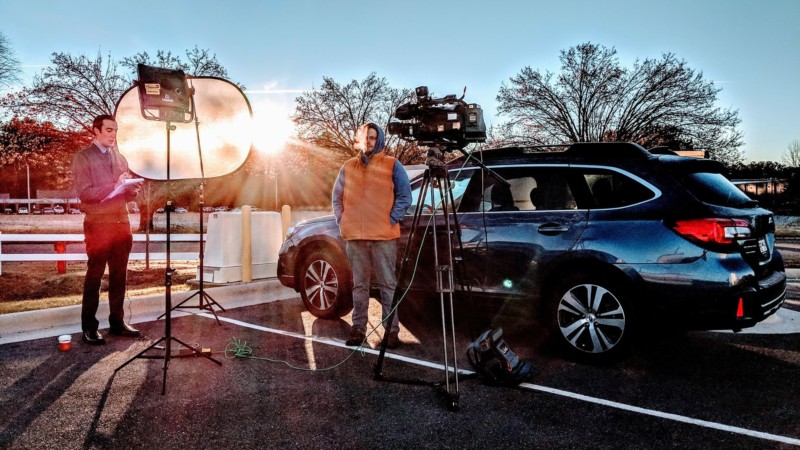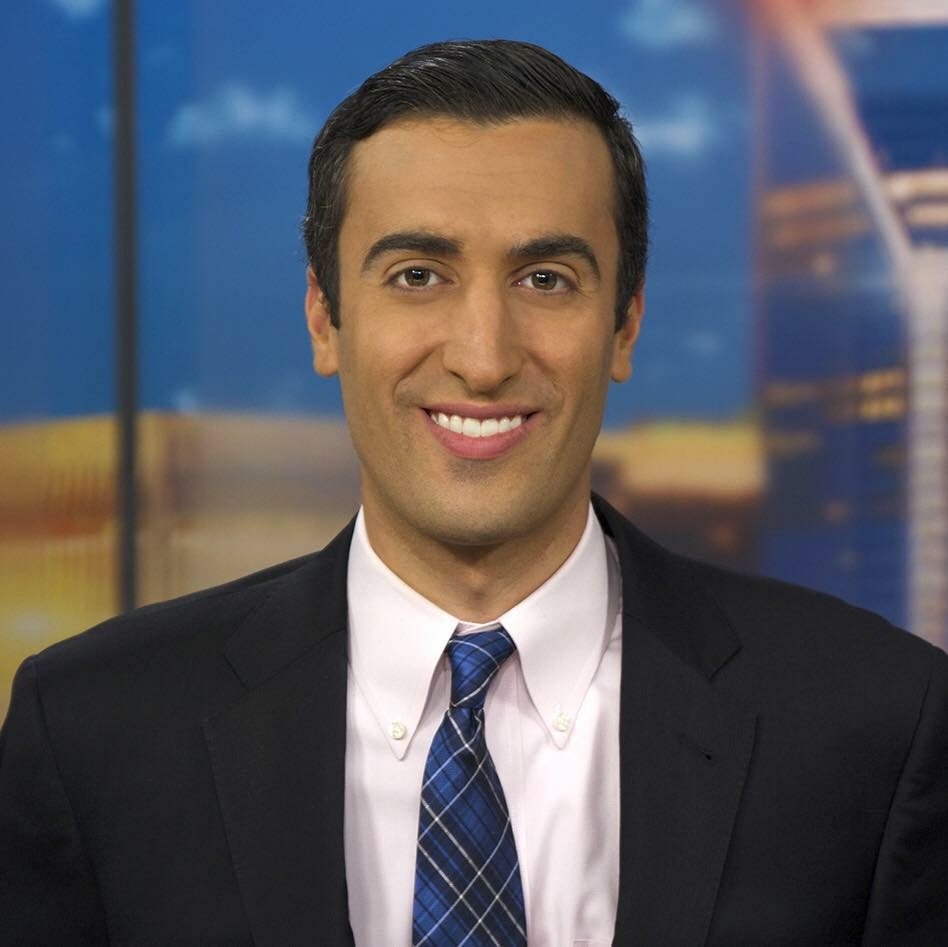Sign up for The Media Today, CJR’s daily newsletter.
Before the networks and international newspapers took over Bladen County, North Carolina, Joe Bruno, a political reporter with WSOC-TV in Charlotte, noticed a national story unfolding in a rural community that pointed to alleged election fraud.
In late November, local news outlets such as WSOC and the Raleigh News and Observer reported that the bipartisan North Carolina State Board of Elections had refused to certify the results of the 9th Congressional District race, in which Republican Mark Harris led Democrat Dan McCready by 905 votes out of more than 280,000 ballots cast. The state board announced it would look into “irregularities,” Charlotte station WSOC-TV reported. Within 24 hours, local coverage had spurred national headlines. More than a month after the midterm elections, the race remains uncertified.
Related: Election fraud fears in North Carolina keep the midterms story alive
Bladen County, the source of the ballot irregularities, is two-and-a-half hours from Charlotte, and outside of WSOC’s typical coverage area. Still, Bruno and colleagues delved deep. WSOC obtained affidavits related to the race that identified a man named Leslie McCrae Dowless—a veteran political operative now at the heart of allegations concerning the illegal handling of absentee ballots. Bruno, along with cameraman Corey Gensler and investigative producer Mike Stolp, met with Braden County residents who told Bruno people had come by to collect their absentee ballots. Soon after, he met two women hired by McCrae Dowless who admitted to picking up ballots.
BREAKING- I have obtained 6 sworn affidavits related to the #NC09 investigation. A team of a dozen @wsoctv employees and I working on this. Huge allegations and potential implications. Stories at 5 and 6 @wsoctv #NCPOL
— Joe Bruno (@JoeBrunoWSOC9) November 29, 2018
As television networks and national outlets descended on Bladen County, they frequently championed Bruno’s reporting. CNN’s Chris Cillizza said Bruno was “doing amazing work on the ground,” while The Washington Post credited his “shoe-leather reporting” and spoke with Bruno about the civic concerns at the core of his recent work:
“I feel like it has helped with at least the public’s knowledge of helping understand what the heck is going on in Bladen County,” Bruno said. It has also “shown that there is something out there that is worth taking a look at,” he said. “That this wasn’t delayed for nefarious reasons. That there is something serious out there that deserves a closer look.”
CJR spoke with Bruno about how his investigation kickstarted a national story, competing for scoops, and what comes next in his coverage. The conversation has been edited for length and clarity.
We didn’t reach out on Facebook first, we didn’t call ahead of time. Eventually, we found two people who were home, talked to us, and admitted they were participating in this elaborate absentee ballot scheme.
When did you know you had to go to Bladen County?
When the State Board of Elections started tossing around words like “fraud” and “irregularities,” we were like, “Wow, we must have something big down there,” because that stuff does not just happen. So, instantly, we recognized this was probably going to be a big story. The congressional district runs from Charlotte to Bladen County, so it was still a Charlotte story in that sense. Some news directors may be hesitant to dive right into a story on the ground in a place so far away when the news story is still fleshing out. My news director and my producers jumped on it right away. As soon as we were able to break the news story wide open with the affidavits, I told my producers we should go to Bladenboro, and they agreed.
Do you think you had an advantage in obtaining those affidavits first?
As a local reporter, I think I had a leg up because sources knew they were providing information they knew I would handle with care. But at the same time, when you’re competing with national resources, at times, it can be overwhelming. So what we decided to do when we got there was to hustle as much as possible because we knew we were competing with newsrooms who would have a ton of people working on the story—if not on the ground, then back at their respective stations and papers.
When we received them, I sat in the middle of the newsroom and everybody who was working in the newsroom surrounded me as we tried to put all the pieces together. It was me and a dozen employees who dropped everything we were doing at 3pm to make sure we could figure out what we could do to get a story on by 5pm that was accurate.
Back in Charlotte after 5 days in Bladen County. Thank you for all the messages. I am truly overwhelmed. This photo was taken last week after a source provided me with documents. Everything you have seen has truly been a team effort. So much more to come on #NC09 pic.twitter.com/8JNO4OOXzU
— Joe Bruno (@JoeBrunoWSOC9) December 7, 2018
We’re really committed to the story. Our producer allowed the stories to be three minutes long. A typical story is about a minute fifteen seconds and they let me tell the story as long as it needed to be so the audience understood what was happening. It was a team effort to make sure the story was told correctly.
You broke story after story those first few days. How did you and your team make that happen?
It was me, my cameraman, and the investigative producer. Over three days, we drove 550 miles and knocked on dozens of doors and we talked to so many people to get this story told. When a source provided me a list with the absentee ballot envelopes, covers of the absentee ballots that were mailed in, we plugged all the information into an excel sheet and checked it by hand. We discovered that there were just these eight people signing as witnesses for all these ballots. So once we figured that out, we just went down the list and started knocking on doors. We didn’t reach out on Facebook first, we didn’t call ahead of time. Eventually, we found two people who were home, talked to us, and admitted they were participating in this elaborate absentee ballot scheme.
Two weeks from now, I’ll probably be covering Charlotte City Council. So this is all kind of surreal to me.
You were able to get people who had potentially committed crimes open up to you on camera twice.
It was really just important to me to make sure I was authentic when I approached people and did not come off as a big- city reporter, coming down to make people feel bad or uncomfortable. I thought it was so important for me to treat everyone with respect so they would feel more comfortable telling their story. That’s important to keep in mind when covering stories you might not usually, and meeting people you don’t usually interact with regularly. I also think I was in the right place at the right time. I think we got to them first. It just came back to hustling and doing the research.
Multiple outlets, yours included, reported absentee ballot schemes may have gone on for a while in Bladen County, but have gone mostly unnoticed by the media. Is Bladen County in a black hole of coverage?
Bladen County is in the Wilmington media market, and then Robeson County is on the outskirts of the Myrtle Beach market. I didn’t even see a local newspaper down in Bladen County. It’s a really underserved media market, so I’m glad that if these issues have been going on for years and people have been trying to raise the warning signs as they say they have for years. [Editor’s note: UNC’s Center for Innovation and Sustainability in Local Media identified a single newspaper, published weekly, in Bladen County.]

Bruno (left) goes live with CNN from North Carolina. Photo by Corey Gensler.
How did WSOC-TV keep this going as a national story for nearly two weeks?
My producers and news director pitched an hour-long live special that we advertised to people who might not live in Charlotte. We told people to download it on Roku and Apple TV or on mobile from wherever they live. We got some great feedback. People said it helped them understand what was happening.
There was a “wow moment” when The Washington Post credited my journalism to expose the election fraud. Two weeks ago, I was covering Charlotte City Council. Two weeks from now, I’ll probably be covering Charlotte City Council. So this is all kind of surreal to me. I’m so embedded in this story. Unfortunately, I had a dream about Mark Harris and Dan McCready last night.
How did residents react when you arrived to report?
They all knew why we were there. They all knew someone who knew someone who was involved. A lot of them knew Bladen County had always had some issues surrounding elections. What people told us, this has happened for years. They didn’t think anything of it: people came around for years collecting ballots. They didn’t think anything of it until local media and national media came swarming into Bladen County.
ICYMI: Read midterm dispatches from CJR’s States of the Union
Has America ever needed a media defender more than now? Help us by joining CJR today.



